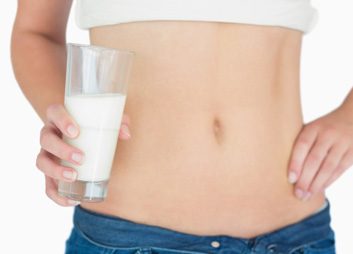
It can help you lose weight
Here’s a reason to drink milk your mom didn’t know: It may help you lose weight. Purdue University researchers found that people who got 1,300 to 1,400 milligrams of calcium a day from dairy products had less body fat after 18 months. And researchers at the University of Tennessee have found much the same thing.
Calcium, it turns out, may play a part in how fat is broken down and stored. The more calcium in a fat cell, the more fat it burns. In a study of obese adults, one group ate three 175-gram (6-ounce) servings of fat-free yogurt containing 1,100 milligrams of calcium per day. The other group ate one serving of dairy food containing 400 to 500 milligrams of calcium per day. Both groups also reduced their daily calories by 500. The yogurt group lost an average of more than 6.3 kilograms (14 pounds) compared to an average loss of 5 kilograms (11 pounds) in the low-calcium group. The yogurt group also lost 81 percent more fat from their stomachs. Although studies have found low-fat dairy foods most effective, calcium from other sources, like broccoli or fortified orange juice, works, too.

It fights colon cancer
Calcium and vitamin D are good at protecting against cancer. A study called the Polyp Prevention Trial found that supplementing with both lowered the risk of polyp recurrence by 18 percent. For calcium, aim for 1,200 to 1,500 milligrams daily from food and supplements.

It decreases your risk for type II diabetes
A 20-year study by Boston researchers of almost 84,000 nurses, none of whom had diabetes at the study’s start, found that women who took 1,200 milligrams of calcium and 800 IU of vitamin D per day had a 33 percent lower risk of developing type 2 diabetes than women who consumed much lower amounts.
Not all calcium supplements are equally well absorbed. The body absorbs the calcium from chewable supplements better than from pills. Boston researchers found that 1,200 milligrams daily lowered the risk of type 2 diabetes. To improve absorption, take it in two doses, one in the morning and one at night.

It makes you fertile
At the University of Wisconsin, treatment with calcium and vitamin D restored fertility – at least in male rats. Other research shows that calcium levels increase in sperm during the last seconds before fertilization, providing the burst of energy needed to penetrate the egg. And for women, a Columbia University study found that in those with polycystic ovary syndrome, which interferes with ovulation, calcium and vitamin D helped restore normal menstruation.

It helps you beat PMS symptoms
You’ve probably never thought to reach for milk for your PMS, but maybe you should. In a long-term study of more than 3,000 women, researchers found that the women who drank four servings of low-fat or skim milk a day (or the calcium and vitamin D equivalent in fortified orange juice, low-fat yogurt, and other low-fat dairy foods) had a 40 percent lower risk of developing PMS than the women who had only one serving of milk a week.
Other studies have also shown calcium’s ability to curb PMS symptoms. Researchers aren’t certain why calcium and vitamin D are such a winning pair, but one theory is that PMS may stem from – or at least reveal – a lack of calcium (PMS symptoms are similar to those of calcium deficiency). And researchers do know that in women with PMS, estrogen levels tend to be higher and calcium levels lower than in women without PMS.

It keeps your mouth healthy
That milk on your cereal is rich in calcium, which protects your gums. In a long-term study of 13,000 people, those who ate only half the recommended servings of calcium-rich foods doubled their risk of gum disease.
Scientists speculate that calcium keeps the jawbone stronger, helping it fight invading bacteria.
Related:
• Are you getting enough calcium?
• Which type of milk do you drink?
• The health benefits of milk
